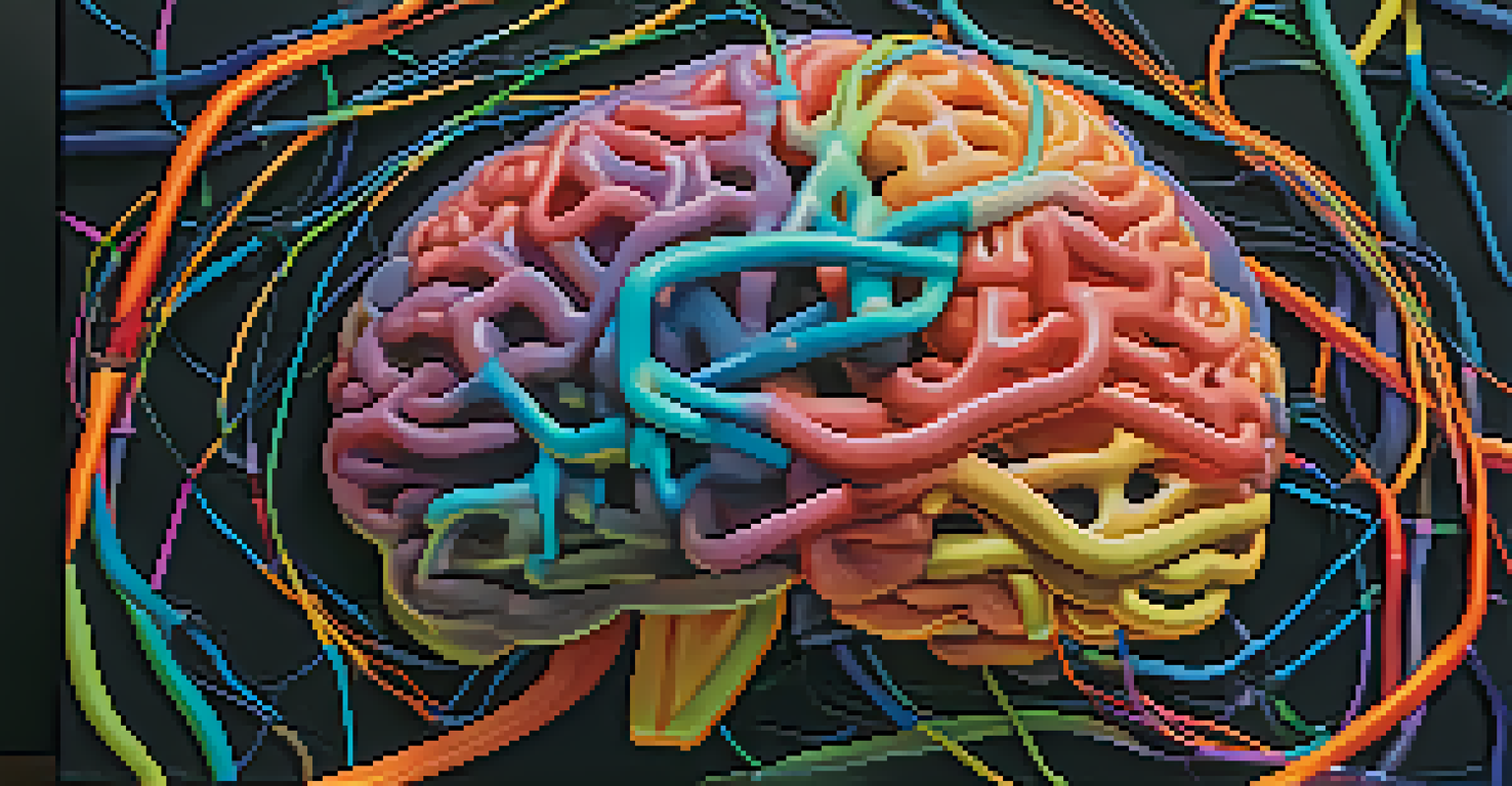LSD in Medicine: Future Clinical Trials and Their Implications

Understanding LSD: A Brief Overview of Its History
LSD, or lysergic acid diethylamide, was first synthesized in 1938, initially explored for its potential in psychotherapy. It gained popularity in the 1960s as part of the counterculture movement, but its medical applications were largely overshadowed by stigma and legal restrictions. However, recent years have seen a resurgence of interest in the therapeutic potential of this powerful psychedelic.
Psychedelics can help us understand the nature of consciousness and the potential for healing within ourselves.
Researchers are now looking back at LSD's early therapeutic use, particularly in treating anxiety, depression, and addiction. This renewed interest has sparked a wave of studies aimed at understanding how LSD can affect the brain and influence mental health. As scientists peel back the layers of its effects, they are finding compelling evidence that suggests LSD may be more than just a recreational drug.
The evolving perception of LSD is not just limited to its history; it reflects a broader change in how society views psychedelics in general. As we start to embrace the idea that these substances can be beneficial in a clinical context, it sets the stage for exciting future trials and applications.
Current Research: Trials Already Underway
Several clinical trials focusing on LSD are currently in progress, with researchers exploring its potential to treat various mental health disorders. For instance, studies are investigating LSD's impact on anxiety associated with terminal illness and its effects on patients suffering from severe depression. These trials are crucial for understanding the efficacy and safety of LSD in controlled environments.

One notable study conducted at a prominent university involves administering low doses of LSD to patients while providing psychotherapy. Early results indicate that participants report significant improvements in their mood and overall mental well-being. This blend of therapeutic practices with LSD is at the forefront of modern clinical approaches to mental health.
LSD's Therapeutic Potential Resurfaces
Recent studies are reviving interest in LSD as a treatment for mental health issues like anxiety and depression.
The outcomes of these studies could pave the way for a new paradigm in treating mental health conditions, allowing for innovative therapies that integrate psychedelics into traditional care models. As these trials progress, they not only contribute to scientific knowledge but also challenge existing treatment frameworks.
Potential Benefits of LSD in Clinical Settings
LSD shows promise for a variety of mental health issues, particularly in promoting emotional breakthroughs. Users often describe experiences of profound insight and connection, which can be transformative during therapy sessions. This ability to foster deep emotional engagement may help patients confront and process challenging feelings that they might otherwise avoid.
The mind is a wonderful servant but a terrible master. We can use psychedelics to navigate our minds and discover the pathways to healing.
Moreover, LSD has been associated with neuroplasticity—the brain's ability to reorganize itself. This means that it might help patients form new neural connections, potentially leading to long-lasting changes in thought patterns and behaviors. Imagine a web of tangled strings suddenly being re-woven into a clearer pattern; that's what LSD might help achieve in the brain.
Additionally, the use of LSD in therapeutic settings could reduce reliance on conventional medications, which often come with a slew of side effects. As we explore these potential benefits, the idea of integrating LSD into treatment plans becomes increasingly compelling.
Challenges and Concerns in LSD Research
Despite the promising potential, LSD research is not without its challenges. Legal hurdles and regulatory restrictions continue to hinder progress, as psychedelics are still classified as Schedule I substances in many regions. This classification creates barriers for researchers seeking funding and approval for clinical trials.
Furthermore, there are ethical concerns surrounding the use of psychedelics in vulnerable populations. Ensuring that patients are fully informed and consenting to participate is paramount, especially given the powerful effects these substances can have. Researchers must navigate these ethical waters carefully to maintain integrity and patient safety.
Challenges Hinder LSD Research
Legal restrictions and public stigma pose significant barriers to advancing LSD research and its acceptance in medicine.
Additionally, public perception remains a significant challenge. While attitudes towards psychedelics are shifting, many people still associate them with the 1960s counterculture, which can lead to skepticism. Overcoming this stigma will be crucial for advancing LSD research and integrating it into mainstream medicine.
Psychedelic Therapy: A New Frontier in Mental Health
The resurgence of interest in psychedelics like LSD is part of a larger movement towards holistic approaches to mental health. This trend emphasizes the importance of treating the whole person rather than just the symptoms of a disorder. By combining psychedelics with psychotherapy, practitioners can create a more comprehensive healing experience.
Psychedelic therapy is not just about the drug; it's about the context in which it is used. Creating a safe and supportive environment for patients can significantly enhance the therapeutic experience. This tailored approach allows individuals to explore their emotions and thoughts deeply, fostering personal growth and healing.
As this new frontier unfolds, it opens up exciting possibilities for mental health treatment. The integration of psychedelics could revolutionize how we approach therapy, making it more personalized and effective for those in need.
Looking Ahead: The Future of LSD in Medicine
As research progresses, the future of LSD in medicine appears promising but requires careful consideration. With more clinical trials on the horizon, we may soon have a clearer understanding of its benefits and risks. The outcomes of these studies will be pivotal in shaping the public perception and acceptance of LSD in therapeutic contexts.
Moreover, the potential for LSD to become a mainstream treatment option could lead to significant changes in mental health care. Imagine a world where psychedelics are integrated into standard treatment protocols, offering new hope for those struggling with mental illness. This vision is becoming more tangible as we continue to explore the therapeutic possibilities of LSD.
Psychedelic Therapy: A New Approach
Integrating psychedelics like LSD into therapy could revolutionize mental health treatment by addressing the whole person.
However, it is essential to approach this future with caution. Ensuring that research is conducted ethically and responsibly will be critical in gaining trust from both the medical community and the public. With the right frameworks in place, we could be on the brink of a revolutionary shift in how we understand and treat mental health.
Conclusion: Embracing the Possibilities of LSD Therapy
In conclusion, the exploration of LSD in medicine represents an exciting chapter in the ongoing quest for effective mental health treatments. As we continue to uncover the complexities of this psychedelic, we may find that it holds the key to unlocking new therapeutic avenues. The potential to help individuals heal from deep-seated emotional struggles is a compelling reason to pursue this research.
While challenges remain, the momentum behind psychedelic research is gaining traction, with increasing support from the scientific community and the public. This shift in perspective could ultimately lead to a more compassionate and effective approach to mental health care, where tools like LSD are used responsibly and ethically.

As we stand on the brink of this new era, it's essential to remain open-minded and informed. The future of LSD in medicine could be bright, offering hope to many who seek relief from mental health challenges, and it's a journey worth taking.